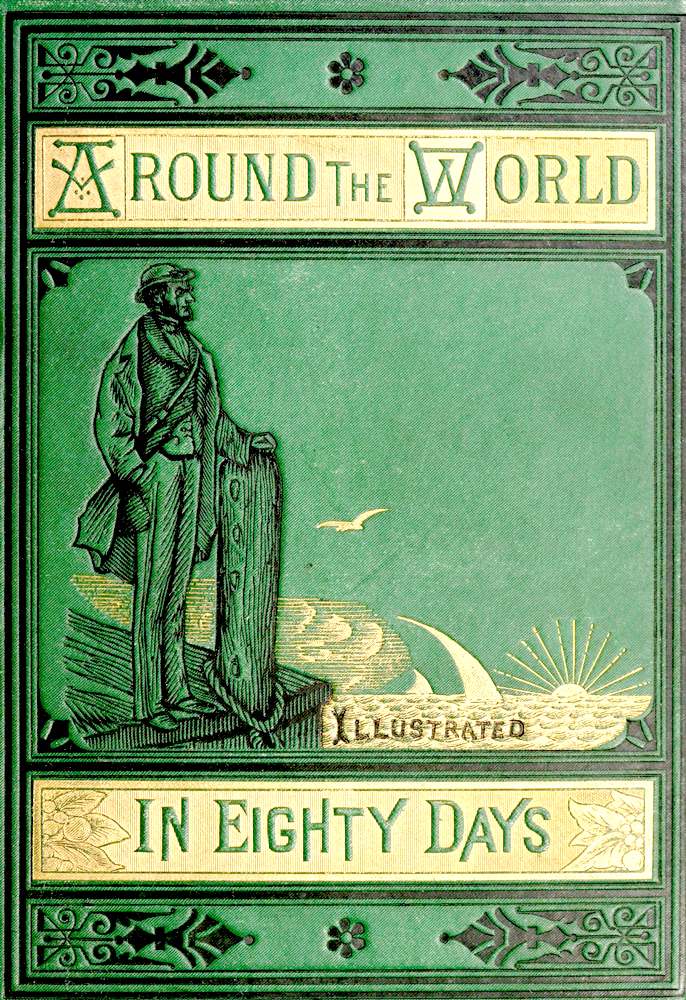|
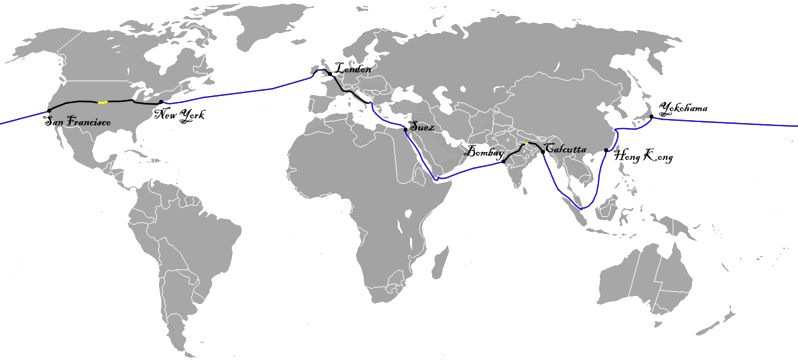
Map
of the route taken by Phileas Fogg, starting in London, then proceeding
east to Suez, Bombay, Calcutta, Hong Kong , Yokohama, San Francisco, New
York, and across the Atlantic
ocean to Ireland, then Liverpool England, and back to London. The route
planner below is for a circumnavigation on water in under 80 days, using
hydrogen, as per the author's prediction in The Mysterious Island. It
would be a major achievement if this was arranged to honor the 150th
anniversary of his publication.
<<<<
CHAPTER XXXIII.
IN WHICH PHILEAS FOGG SHOWS HIMSELF EQUAL TO THE OCCASION
An hour after, the “Henrietta” passed the lighthouse which marks the entrance of the Hudson, turned the point of Sandy Hook, and put to sea. During the day she skirted Long Island, passed Fire Island, and directed her course rapidly eastward.
At noon the next day, a man mounted the bridge to ascertain the vessel’s position. It might be thought that this was Captain Speedy. Not the least in the world. It was Phileas Fogg, Esquire. As for Captain Speedy, he was shut up in his cabin under lock and key, and was uttering loud cries, which signified an anger at once pardonable and excessive.
What had happened was very simple. Phileas Fogg wished to go to Liverpool, but the captain would not carry him there. Then Phileas Fogg had taken passage for Bordeaux, and, during the thirty hours he had been on board, had so shrewdly managed with his banknotes that the sailors and stokers, who were only an occasional crew, and were not on the best terms with the captain, went over to him in a body. This was why Phileas Fogg was in command instead of Captain Speedy; why the captain was a prisoner in his cabin; and why, in short, the “Henrietta” was directing her course towards Liverpool. It was very clear, to see Mr. Fogg manage the craft, that he had been a sailor.
How the adventure ended will be seen anon. Aouda was anxious, though she said nothing. As for Passepartout, he thought Mr. Fogg’s manœuvre simply glorious. The captain had said “between eleven and twelve knots,” and the “Henrietta” confirmed his prediction.
If, then—for there were “ifs” still—the sea did not become too boisterous, if the wind did not veer round to the east, if no accident happened to the boat or its machinery, the “Henrietta” might cross the three thousand miles from New York to Liverpool in the nine days, between the 12th and the 21st of December. It is true that, once arrived, the affair on board the “Henrietta,” added to that of the Bank of England, might create more difficulties for Mr. Fogg than he imagined or could desire.
During the first days, they went along smoothly enough. The sea was not very unpropitious, the wind seemed stationary in the north-east, the sails were hoisted, and the “Henrietta” ploughed across the waves like a real transatlantic steamer.
Passepartout was delighted. His master’s last exploit, the consequences of which he ignored, enchanted him. Never had the crew seen so jolly and dexterous a fellow. He formed warm friendships with the sailors, and amazed them with his acrobatic feats. He thought they managed the vessel like gentlemen, and that the stokers fired up like heroes. His loquacious good-humour infected everyone. He had forgotten the past, its vexations and delays. He only thought of the end, so nearly accomplished; and sometimes he boiled over with impatience, as if heated by the furnaces of the “Henrietta.” Often, also, the worthy fellow revolved around Fix, looking at him with a keen, distrustful eye; but he did not speak to him, for their old intimacy no longer existed.
Fix, it must be confessed, understood nothing of what was going on. The conquest of the “Henrietta,” the bribery of the crew, Fogg managing the boat like a skilled seaman, amazed and confused him. He did not know what to think. For, after all, a man who began by stealing fifty-five thousand pounds might end by stealing a vessel; and Fix was not unnaturally inclined to conclude that the “Henrietta” under Fogg’s command, was not going to Liverpool at all, but to some part of the world where the robber, turned into a pirate, would quietly put himself in safety. The conjecture was at least a plausible one, and the detective began to seriously regret that he had embarked on the affair.
As for Captain Speedy, he continued to howl and growl in his cabin; and Passepartout, whose duty it was to carry him his meals, courageous as he was, took the greatest precautions. Mr. Fogg did not seem even to know that there was a captain on board.
On the 13th they passed the edge of the Banks of Newfoundland, a dangerous locality; during the winter, especially, there are frequent fogs and heavy gales of wind. Ever since the evening before the barometer, suddenly falling, had indicated an approaching change in the atmosphere; and during the night the temperature varied, the cold became sharper, and the wind veered to the south-east.
This was a misfortune. Mr. Fogg, in order not to deviate from his course, furled his sails and increased the force of the steam; but the vessel’s speed slackened, owing to the state of the sea, the long waves of which broke against the stern. She pitched violently, and this retarded her progress. The breeze little by little swelled into a tempest, and it was to be feared that the “Henrietta” might not be able to maintain herself upright on the waves.
Passepartout’s visage darkened with the skies, and for two days the poor fellow experienced constant fright. But Phileas Fogg was a bold mariner, and knew how to maintain headway against the sea; and he kept on his course, without even decreasing his steam. The “Henrietta,” when she could not rise upon the waves, crossed them, swamping her deck, but passing safely. Sometimes the screw rose out of the water, beating its protruding end, when a mountain of water raised the stern above the waves; but the craft always kept straight ahead.
The wind, however, did not grow as boisterous as might have been feared; it was not one of those tempests which burst, and rush on with a speed of ninety miles an hour. It continued fresh, but, unhappily, it remained obstinately in the south-east, rendering the sails useless.
The 16th of December was the seventy-fifth day since Phileas Fogg’s departure from London, and the “Henrietta” had not yet been seriously delayed. Half of the voyage was almost accomplished, and the worst localities had been passed. In summer, success would have been well-nigh certain. In winter, they were at the mercy of the bad season. Passepartout said nothing; but he cherished hope in secret, and comforted himself with the reflection that, if the wind failed them, they might still count on the steam.
On this day the engineer came on deck, went up to Mr. Fogg, and began to speak earnestly with him. Without knowing why it was a presentiment, perhaps Passepartout became vaguely uneasy. He would have given one of his ears to hear with the other what the engineer was saying. He finally managed to catch a few words, and was sure he heard his master say, “You are certain of what you tell me?”
“Certain, sir,” replied the engineer. “You must remember that, since we started, we have kept up hot fires in all our furnaces, and, though we had coal enough to go on short steam from New York to Bordeaux, we haven’t enough to go with all steam from New York to Liverpool.” “I will consider,” replied Mr. Fogg.
Passepartout understood it all; he was seized with mortal anxiety. The coal was giving out! “Ah, if my master can get over that,” muttered he, “he’ll be a famous man!” He could not help imparting to Fix what he had overheard.
“Then you believe that we really are going to Liverpool?”
“Of course.”
“Ass!” replied the detective, shrugging his shoulders and turning on his heel.
Passepartout was on the point of vigorously resenting the epithet, the reason of which he could not for the life of him comprehend; but he reflected that the unfortunate Fix was probably very much disappointed and humiliated in his self-esteem, after having so awkwardly followed a false scent around the world, and refrained.
And now what course would Phileas Fogg adopt? It was difficult to imagine. Nevertheless he seemed to have decided upon one, for that evening he sent for the engineer, and said to him, “Feed all the fires until the coal is exhausted.”
A few moments after, the funnel of the “Henrietta” vomited forth torrents of smoke. The vessel continued to proceed with all steam on; but on the 18th, the engineer, as he had predicted, announced that the coal would give out in the course of the day.
“Do not let the fires go down,” replied Mr. Fogg. “Keep them up to the last. Let the valves be filled.”
Towards noon Phileas Fogg, having ascertained their position, called Passepartout, and ordered him to go for Captain Speedy. It was as if the honest fellow had been commanded to unchain a tiger. He went to the poop, saying to himself, “He will be like a madman!”
In a few moments, with cries and oaths, a bomb appeared on the poop-deck. The bomb was Captain Speedy. It was clear that he was on the point of bursting. “Where are we?” were the first words his anger permitted him to utter. Had the poor man been an apoplectic, he could never have recovered from his paroxysm of wrath.
“Where are we?” he repeated, with purple face.
“Seven hundred and seven miles from Liverpool,” replied Mr. Fogg, with imperturbable calmness.
“Pirate!” cried Captain Speedy.
“I have sent for you, sir—”
“Pickaroon!”
“—sir,” continued Mr. Fogg, “to ask you to sell me your vessel.”
“No! By all the devils, no!”
“But I shall be obliged to burn her.”
“Burn the ‘Henrietta’!”
“Yes; at least the upper part of her. The coal has given out.”
“Burn my vessel!” cried Captain Speedy, who could scarcely pronounce the words. “A vessel worth fifty thousand dollars!”
“Here are sixty thousand,” replied Phileas Fogg, handing the captain a roll of bank-bills. This had a prodigious effect on Andrew Speedy. An American can scarcely remain unmoved at the sight of sixty thousand dollars. The captain forgot in an instant his anger, his imprisonment, and all his grudges against his passenger. The “Henrietta” was twenty years old; it was a great bargain. The bomb would not go off after all. Mr. Fogg had taken away the match.
“And I shall still have the iron hull,” said the captain in a softer tone.
“The iron hull and the engine. Is it agreed?”
“Agreed.”
And Andrew Speedy, seizing the banknotes, counted them and consigned them to his pocket.
During this colloquy, Passepartout was as white as a sheet, and Fix seemed on the point of having an apoplectic fit. Nearly twenty thousand pounds had been expended, and Fogg left the hull and engine to the captain, that is, near the whole value of the craft! It was true, however, that fifty-five thousand pounds had been stolen from the Bank.
When Andrew Speedy had pocketed the money, Mr. Fogg said to him, “Don’t let this astonish you, sir. You must know that I shall lose twenty thousand pounds, unless I arrive in London by a quarter before nine on the evening of the 21st of December. I missed the steamer at New York, and as you refused to take me to Liverpool—”
“And I did well!” cried Andrew Speedy; “for I have gained at least forty thousand dollars by it!” He added, more sedately, “Do you know one thing, Captain—”
“Fogg.”
“Captain Fogg, you’ve got something of the Yankee about you.”
And, having paid his passenger what he considered a high compliment, he was going away, when Mr. Fogg said, “The vessel now belongs to me?”
“Certainly, from the keel to the truck of the masts—all the wood, that is.”
“Very well. Have the interior seats, bunks, and frames pulled down, and burn them.”
It was necessary to have dry wood to keep the steam up to the adequate pressure, and on that day the poop, cabins, bunks, and the spare deck were sacrificed. On the next day, the 19th of December, the masts, rafts, and spars were burned; the crew worked lustily, keeping up the fires. Passepartout hewed, cut, and sawed away with all his might. There was a perfect rage for demolition.
The railings, fittings, the greater part of the deck, and top sides disappeared on the 20th, and the “Henrietta” was now only a flat hulk. But on this day they sighted the Irish coast and Fastnet Light. By ten in the evening they were passing Queenstown. Phileas Fogg had only twenty-four hours more in which to get to London; that length of time was necessary to reach Liverpool, with all steam on. And the steam was about to give out altogether!
“Sir,” said Captain Speedy, who was now deeply interested in Mr. Fogg’s project, “I really commiserate you. Everything is against you. We are only opposite Queenstown.”
“Ah,” said Mr. Fogg, “is that place where we see the lights Queenstown?”
“Yes.”
“Can we enter the harbour?”
“Not under three hours. Only at high tide.”
“Stay,” replied Mr. Fogg calmly, without betraying in his features that by a supreme inspiration he was about to attempt once more to conquer ill-fortune.
Queenstown is the Irish port at which the transatlantic steamers stop to put off the mails. These mails are carried to Dublin by express trains always held in readiness to start; from Dublin they are sent on to Liverpool by the most rapid boats, and thus gain twelve hours on the Atlantic steamers.
Phileas Fogg counted on gaining twelve hours in the same way. Instead of arriving at Liverpool the next evening by the “Henrietta,” he would be there by noon, and would therefore have time to reach London before a quarter before nine in the evening.
The “Henrietta” entered Queenstown Harbour at one o’clock in the morning, it then being high tide; and Phileas Fogg, after being grasped heartily by the hand by Captain Speedy, left that gentleman on the levelled hulk of his craft, which was still worth half what he had sold it for.
The party went on shore at once. Fix was greatly tempted to arrest Mr. Fogg on the spot; but he did not. Why? What struggle was going on within him? Had he changed his mind about “his man”? Did he understand that he had made a grave mistake? He did not, however, abandon Mr. Fogg. They all got upon the train, which was just ready to start, at half-past one; at dawn of day they were in Dublin; and they lost no time in embarking on a steamer which, disdaining to rise upon the waves, invariably cut through them.
Phileas Fogg at last disembarked on the Liverpool quay, at twenty minutes before twelve, 21st December. He was only six hours distant from London.
But at this moment Fix came up, put his hand upon Mr. Fogg’s shoulder, and, showing his warrant, said, “You are really Phileas Fogg?”
“I am.”
“I arrest you in the Queen’s name!”
NEXT
>>>>
CHAPTERS
1. - I. IN WHICH PHILEAS FOGG AND PASSEPARTOUT ACCEPT EACH OTHER, THE ONE AS
MASTER AND AS MAN
2. - II. IN WHICH PASSEPARTOUT IS CONVINCED THAT HE HAS AT LAST FOUND HIS IDEAL
3. - III. IN WHICH A CONVERSATION TAKES PLACE WHICH SEEMS LIKELY TO COST PHILEAS FOGG DEAR
4. - IV. IN WHICH PHILEAS FOGG ASTOUNDS
PASSEPARTOUT, HIS SERVANT
5. - V. IN WHICH A NEW SPECIES OF FUNDS, UNKNOWN TO THE MONEYED MEN, APPEARS ON ’CHANGE
6. - VI. IN WHICH FIX, THE DETECTIVE, BETRAYS A VERY NATURAL IMPATIENCE
7. - VII. WHICH ONCE MORE DEMONSTRATES THE USELESSNESS OF PASSPORTS AS AIDS TO DETECTIVES
8. - VIII. IN WHICH PASSEPARTOUT TALKS RATHER MORE, PERHAPS, THAN IS PRUDENT
9. - IX. IN WHICH THE RED SEA AND THE INDIAN OCEAN PROVE PROPITIOUS TO THE DESIGNS OF PHILEAS FOGG
10. - X. IN WHICH PASSEPARTOUT IS ONLY TOO GLAD TO GET OFF WITH THE LOSS OF HIS SHOES
11. - XI. IN WHICH PHILEAS FOGG SECURES A CURIOUS MEANS OF CONVEYANCE AT A FABULOUS PRICE
12. - XII. IN WHICH PHILEAS FOGG AND HIS COMPANIONS VENTURE ACROSS THE INDIAN FORESTS, AND WHAT ENSUED
13. - XIII. IN WHICH PASSEPARTOUT RECEIVES A NEW PROOF THAT FORTUNE FAVORS THE BRAVE
14. - XIV. FOGG DESCENDS THE LENGTH OF THE BEAUTIFUL VALLEY OF THE GANGES WITHOUT EVER THINKING OF SEEING IT
15. - XV. IN WHICH THE BAG OF BANKNOTES DISGORGES SOME THOUSANDS OF POUNDS MORE
16. - XVI. IN WHICH FIX DOES NOT SEEM TO UNDERSTAND IN THE LEAST WHAT IS SAID TO HIM
17. - XVII. SHOWING WHAT HAPPENED ON THE VOYAGE FROM SINGAPORE TO HONG KONG
18. - XVIII. IN WHICH PHILEAS FOGG, PASSEPARTOUT, AND FIX GO EACH ABOUT HIS BUSINESS
19. - XIX. IN WHICH PASSEPARTOUT TAKES A TOO GREAT INTEREST IN HIS MASTER, AND WHAT COMES OF IT
20. - XX. IN WHICH FIX COMES FACE TO FACE WITH PHILEAS FOGG
21. - XXI. IN WHICH THE MASTER OF THE “TANKADERE” RUNS GREAT RISK OF LOSING A REWARD OF TWO HUNDRED POUNDS
22. - XXII. PASSEPARTOUT DISCOVERS IT IS CONVENIENT TO HAVE MONEY IN ONE’S POCKET
AT THE ANTIPODES
23. - XXIII. IN WHICH PASSEPARTOUT’S NOSE BECOMES OUTRAGEOUSLY LONG
24. - XXIV. DURING WHICH MR. FOGG AND PARTY CROSS THE PACIFIC OCEAN
25. - XXV. IN WHICH A SLIGHT GLIMPSE IS HAD OF SAN FRANCISCO
26. - XXVI. IN WHICH PHILEAS FOGG AND PARTY TRAVEL BY THE PACIFIC RAILROAD
27. - XXVII. IN WHICH PASSEPARTOUT UNDERGOES, AT A SPEED OF 20 MPH, A COURSE OF MORMON HISTORY
28. - XXVIII. IN WHICH PASSEPARTOUT DOES NOT SUCCEED IN MAKING ANYBODY LISTEN TO REASON
29. - XXIX. IN WHICH CERTAIN INCIDENTS ARE NARRATED WHICH ARE ONLY TO BE MET WITH ON AMERICAN RAILROADS
30. - XXX. IN WHICH PHILEAS FOGG SIMPLY DOES HIS DUTY
31. - XXXI. IN WHICH FIX, THE DETECTIVE, CONSIDERABLY FURTHERS THE INTERESTS OF PHILEAS FOGG
32. - XXXII. IN WHICH PHILEAS FOGG ENGAGES IN A DIRECT STRUGGLE WITH BAD FORTUNE
33. - XXXIII. IN WHICH PHILEAS FOGG SHOWS HIMSELF EQUAL TO THE OCCASION
34. - XXXIV. IN WHICH PHILEAS FOGG AT LAST REACHES LONDON
35. - XXXV. IN WHICH PHILEAS FOGG DOES NOT HAVE TO REPEAT HIS ORDERS TO PASSEPARTOUT TWICE
36. - XXXVI. IN WHICH PHILEAS FOGG’S NAME IS ONCE MORE AT A PREMIUM ON ’CHANGE
37. - XXXVII. PHILEAS FOGG FINDS HE GAINED NOTHING BY HIS TOUR AROUND THE WORLD, UNLESS IT WERE HAPPINESS
PLOT
- AROUND
THE WORLD IN EIGHTY DAYS
The story starts in London on October 2, 1872. Phileas Fogg is a wealthy, solitary, unmarried gentleman with regular habits. The source of his wealth is not known and he lives modestly. He fires his former valet, James Forster, for bringing him shaving
water two degrees too cold. He hires as a replacement
Passepartout, a Frenchman of around 30 years of age.
Later that day in the Reform Club, he gets involved in an argument over an article in
The Daily
Telegraph, stating that with the opening of a new railway section in India, it is now possible to travel around the world in 80 days.
Fogg accepts a wager for £20,000 from his fellow club members, which he will receive if he makes it around the world in 80 days. Accompanied by his manservant
Passepartout, he leaves London by train at 8.45 p.m. on October 2, 1872, and thus is due back at the Reform Club at the same time 80 days later, on December 21.


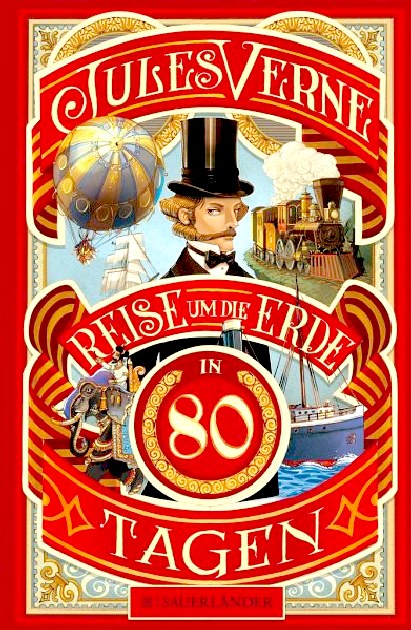
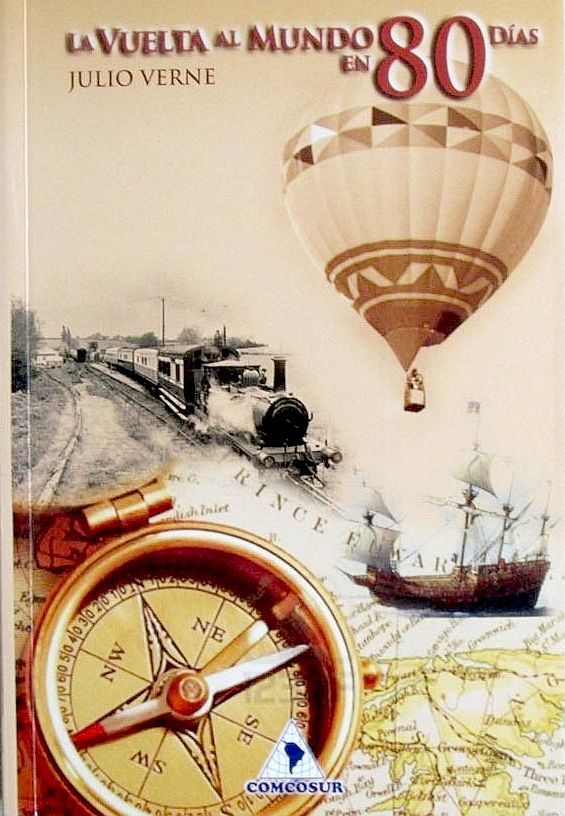

Many
of his stories today seem a little tame, as technology has caught up
with the imagination of the extraordinary French author, and Hollywood
has discovered Computer Generated Images (CGI) allowing super heroes to
grace our screens as never before. Computers are one thing that Verne
did not imagine or seek to portray.
Beginning in late 1872, the serialized version of Verne's famed Around the World in Eighty Days (Le Tour du monde en quatre-vingts jours) first appeared in print. The story of Phileas Fogg and Jean Passepartout takes readers on an adventurous global tour at a time when travel was becoming easier and alluring. In the century plus since its original debut, the work has been adapted for the theater, radio, television and film, including the classic 1956 version starring David
Niven. The TV series starring Pierce Brosnan released in 1989, runs for around 6 hours on
2 DVDs. A BBC
TV travel documentary starring Michael Palin, was also screened in
1989. A second TV series starring David Tennant was produced by the
BBC for 2021.
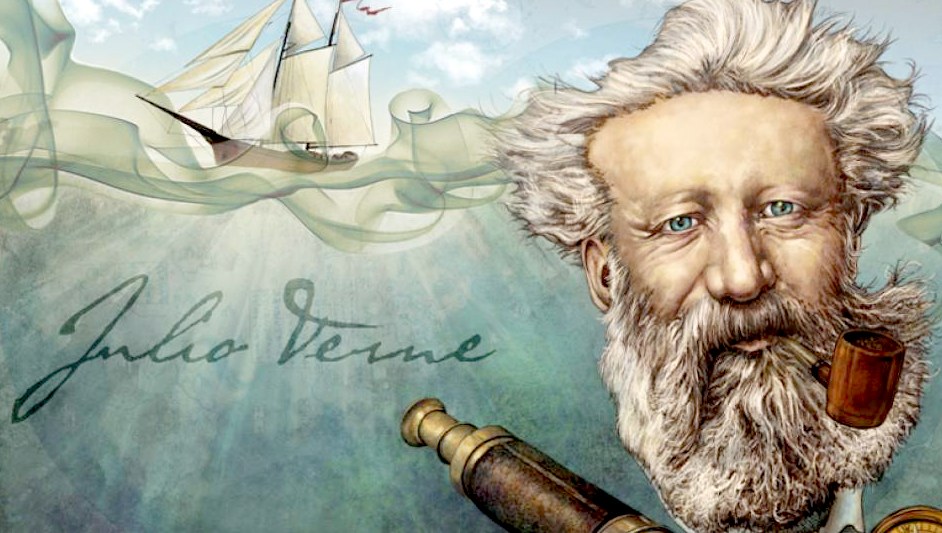
Jules
Verne is known as the Father of Science Fiction
Where
Jules Verne's suggested that it might be possible to travel
Around The
World In 80 Days, we would like to extend that ethos to include
traveling in a Zero
Emission yacht (ZEWT or ZEV) driven by electric
hydro-jets? With the advent of solar power, liquid hydrogen, methanol
reformers, and fuel
cells - we'll wager that it is a distinct possibility - on a scale of the
stake that the legendary Philleas Fogg entered into at the Reform Club in
1872. Now there's a challenge for you. Place your bets!
|







